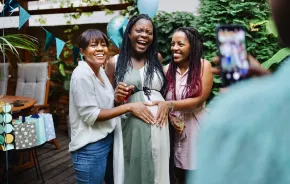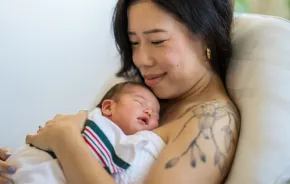Let's Talk About Infertility

Kali Sakai
I didn’t think getting pregnant would be a problem. But after a year of trying, my husband and I turned infertility into a project. I made a binder full of test results, charts, research, handouts and notes, which I looked at daily and brought to all my appointments.
Looking back, though, I wish we’d gone to a fertility clinic in the first place, right when we sensed something was off. Instead, we spent months trying this and that with my OB, who was a skilled obstetrician and surgeon but not a fertility specialist.
She eventually introduced some Clomid and a hormone shot. That seemed to do the trick; I got pregnant. But we were so excited that we couldn’t manage to contain ourselves before the milestone 12-week appointment and we prematurely announced our pregnancy at a party.
A few days later, we sauntered into the exam room eager for our ultrasound printouts. I knew what to expect; I'd seen photos of healthy 12-week-along ultrasounds on the internet so the moment the tech put the wand on my tummy and the image flickered on, I knew.
Instead of a recognizable head and body, there was just a tiny mass at the bottom of the screen. Apparently, the viable pregnancy we’d seen at the OB checkup a few weeks earlier with the diamond sparkle heartbeat hadn’t endured.
The loss at 12 weeks spawned a flood of introspection and doubt. Before when I had heard about other women having miscarriages, I just couldn’t understand why they got so worked up, especially if something was wrong with the embryo or fetus. A miscarriage in that case would be a good thing, right? But the loss absolutely crushed me. My usually steady demeanor swung from crying to calm to anger then sadness.
I felt trapped in the present — not able to plan or celebrate or relax — but stuck in a place where I wanted to escape as fast as possible. More than anything, I desperately wanted to make progress and I thought the sooner we got pregnant again, the better. Surely that would take the pain away.
So I pulled out the binder and prepared to try again. But as it turned out, I didn’t have another menstrual cycle for five excruciating months. With all that time to wait, I was forced to face my feelings of disappointment, loss and fear, and that I may never have a viable pregnancy. That’s where my mind went and I even began compiling lists of adoption agencies in my binder.
I took this time to personally define my limits about what I was willing to endure to conceive again. It gave me a sliver of control and helped put an emotional backstop on this ‘unnaturally natural’ process. I also read a book by James Schwartz.
"The Mind-Body Fertility Connection" helped connect attitude, mindfulness and working through emotional roadblocks so my body was receptive to conception. That might sound far-fetched but I felt that coming to terms with the miscarriage helped lift a weight off my mind; I believe it opened the door for a positive outcome. (Actually two. This fall, one of them will be in fourth grade and the other in first.)
So, what would I recommend to someone going through what I did? Work with an actual fertility specialist, have a better understanding of your feelings and remember something a nurse once told me: "You’ll be a parent someday but it might not look like what you thought it would look like."
In my darkest moments, remembering that helped most of all.









